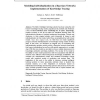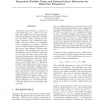241 search results - page 21 / 49 » Parameter learning for relational Bayesian networks |
120
click to vote
ILP
2007
Springer
15 years 6 months ago
2007
Springer
A recurrent question in the design of intelligent agents is how to assign degrees of beliefs, or subjective probabilities, to various events in a relational environment. In the sta...
ML
2006
ACM
14 years 11 months ago
2006
ACM
In this paper, we describe the syntax and semantics for a probabilistic relational language (PRL). PRL is a recasting of recent work in Probabilistic Relational Models (PRMs) into ...
211
click to vote
UM
2010
Springer
15 years 4 months ago
2010
Springer
The field of intelligent tutoring systems has been using the well known knowledge tracing model, popularized by Corbett and Anderson (1995) to track individual users’ knowledge f...
ICML
2006
IEEE
16 years 19 days ago
2006
IEEE
Many of today's best classification results are obtained by combining the responses of a set of base classifiers to produce an answer for the query. This paper explores a nov...
103
click to vote
UAI
2004
15 years 1 months ago
2004
A Bayesian belief network is a model of a joint distribution over a finite set of variables, with a DAG structure representing immediate dependencies among the variables. For each...


